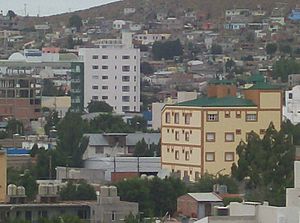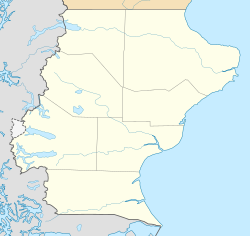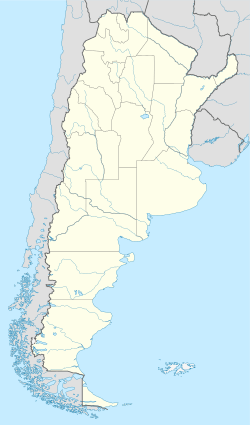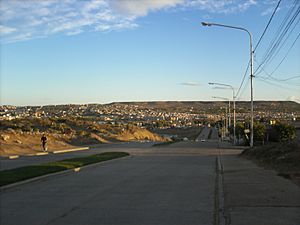Caleta Olivia facts for kids
Quick facts for kids
Caleta Olivia
|
|
|---|---|
|
City and Port
|
|
 |
|
| Country | |
| Province | |
| Department | Deseado |
| Founded | November 20, 1901 |
| Founded by | Exequiel Guttero |
| Area | |
| • Total | 55 km2 (21 sq mi) |
| Elevation | 13 m (43 ft) |
| Population
(2010 census)
|
|
| • Total | 51,733 |
| • Density | 941/km2 (2,436/sq mi) |
| Time zone | UTC-3 (ART) |
| CPA base |
Z9011
|
| Dialing code | +54 297 |
| Climate | BSk |
| Website | Official website: http://www.caletaolivia.gov.ar/ |
Caleta Olivia is a city and port located in the northeast part of Santa Cruz, a province in Argentina. It sits right on the San Jorge Gulf, which is part of the Atlantic Ocean. In 2010, about 70,304 people lived there. It's the second biggest city in the province, after Rio Gallegos, and the largest in the Deseado Department.
Contents
History of Caleta Olivia
The city was officially started on November 20, 1901. It was founded by Navy Lieutenant Exequiel Guttero. He was the captain of a ship called the Guardia Nacional. This ship was carrying important supplies like cables and equipment, along with workers. They were building a telegraph line south of Comodoro Rivadavia. Lieutenant Guttero named the settlement "Caleta Olivia" after his wife, Olivia. The word caleta means "small bay" or "inlet" in Spanish.
What Caleta Olivia is Known For
Caleta Olivia is an important place for several reasons. Its main activities include getting petroleum (oil) from the ground, raising sheep, and fishing. The city has a port that is used for both fishing and for sending out goods made in the area.
The Gorosito Monument
One of the most famous landmarks in Caleta Olivia is a monument called "El Gorosito." This special statue was built to honor the hard work of people in the petroleum industry. It's a symbol of the city's connection to oil production.
Climate and Weather
Caleta Olivia has a cool, dry climate, which scientists call a "cold semi-arid climate". This means it has warm summers and cold winters. It doesn't rain much here, with only about 200.7 millimeters of rain each year.
Even though the city is far south, the ocean helps keep the temperatures from getting too extreme. During sunny summer days, people enjoy visiting the beaches. They can do different water sports and play games on the sand.
See also

- In Spanish: Caleta Olivia para niños
 | Ernest Everett Just |
 | Mary Jackson |
 | Emmett Chappelle |
 | Marie Maynard Daly |




